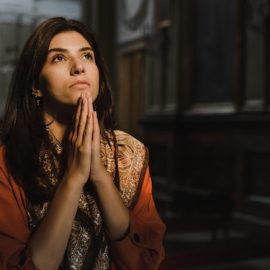

This article is an excerpt from the Shortform book guide to "Eat Pray Love" by Elizabeth Gilbert. Shortform has the world's best summaries and analyses of books you should be reading.
Like this article? Sign up for a free trial here .
What does finding your word mean? How does Eat Pray Love explore this idea?
In Eat Pray Love, finding your word is one of Elizabeth Gilbert’s missions. She travels around the world, meets new people, uncovers her spirituality, and eventually chooses her word.
Read more about finding your word in Eat Pray Love and Elizabeth Gilbert’s journey.
Finding Your Word
The idea of finding your word wasn’t always a part of Elizabeth’s quest. Gilbert returned to Rome and was happy to be back among the eclectic and independent Romans after the dark conservative tone of Venice. But she also found she was eager to get to India. She thought Rome was a beautiful city, but she knew it wasn’t her city.
Giulio, her American friend Maria’s husband, helped her realize why she didn’t truly feel connected to the city she’d called home for almost four months. He said each city had a word that described its essence and the essence of the people. In Rome, the word was “sex.” Gilbert argued that not all people were thinking about sex, but Giulio disagreed. Sex oozed through the atmosphere of the city—in the clothes, in the attitudes, in the nightlife, in the food. Whether people were seeking it, refusing it, or trying to ignore it, everything revolved around sex.
Gilbert now understood why Rome was not her city. Her celibacy vow had turned the sex part of her off, so she could never connect with that heart of the culture. She started to wonder what word described her essence. She believed New York’s word was “achieve,” which described her in her twenties. Her family word was somewhere between “frugal” and “irreverent,” but neither of those described her.
Gilbert started to seriously consider what her word was. She knew it wasn’t “marriage” or “family,” which explained why she was miserable in her nuclear community Upstate with her husband. It wasn’t the ambitious tone of “achieve” anymore, but it also wasn’t pure “pleasure.” She realized her journey was likely more about finding her word than anything else. But what does finding your word mean exactly, and how does someone do it?
The Way Forward
Other retreat groups came and went during Gilbert’s last weeks at the Ashram. She continued her duties diligently and experienced turiya a few more times. These experiences changed her to the point that the retreat attendants said she was a stabilizing, peaceful, and spiritual force for them. She had to laugh. In accepting herself as a talker, she’d become the quiet girl.
The scorching summer months were approaching quickly, and the Ashram would soon empty out. Each day, Gilbert said goodbye to friends she’d made during her months there. There was a melancholy feeling in the air, but it was also bittersweet.
During her last week, she found more time to be alone. She was okay with being alone now and could sit in silence for many hours. Her meditative sessions swung between the overwhelming energy of the blue light and quiet calm. Either was fine. She no longer fought the sensations. Now, when thoughts came, she accepted them and moved on. She was so used to the ways of her mind now, there was no need to be confused or affected by it.
On one of her last nights, Gilbert couldn’t sleep. She crawled out of bed and went for a walk. In the garden, she could smell the sweetness of nature. She felt the warm breeze on her skin. It hit her so completely in that moment where she was—India! Like a fledgling learning to fly, she took off through the meadow and frolicked in the moonlight. She hugged a eucalyptus tree and kissed it with love. She saw God in everything around her and knew her prayers had been answered. She was pure joy.
It was likely no coincidence, then, that Gilbert found her word shortly before she left the Ashram. She was reading a Yoga text and came across the word antevasin. Translated, this word means “someone who lives on the border of two worlds.”
In ancient times, it was a literal translation regarding someone leaving the city to dwell at the boundary of the unknown forest. In modern times, it describes the figurative border between your old self and your new self. You never fully cross-over into the new self. You stay at the boundary, learning and moving forward. But there is always more to learn, so the new self keeps moving too. The journey never ends.
As soon as Gilbert saw this word, she knew it was hers. She’d always questioned who she was or who she was supposed to be. What was her role? A wife? A lover? An overeater of pasta? A lost soul? Now she knew she was all of those things and none of them completely. She was a student of life. And she would remain at the boundary of learning as she moved forward through the unknown, and worked on the idea of “finding your word.”
Gilbert took Felipe to Gili Meno, a small island off the coast of Bali. The island was so small, you could walk the perimeter within an hour. Gilbert chose this island for their vacation because she’d been there before. When she visited Bali two years ago, she took a 10-day trip by herself to the island for a silent retreat.
Gilbert was in the middle of her divorce at the time. The years of suffering and guilt leading up to the separation, the trauma of separating, and the heartbreak from David had left her scraping the bottom of her life. She wanted to be alone and in complete silence so she could find a way to manage the demons that lived inside.
During those 10 days, she walked the island twice each day and sat on the beach with her thoughts. She knew enough about Yogic tradition to know that thoughts are what bring emotions, both good and bad. Her thoughts were all bad, so she always felt pain. She figured if she kept silent and let the thoughts run their course, she could reduce their power.
It took three days for her mind to quiet down enough for her to examine each thought separately. She invited the sorrowful thoughts to enter one at a time. She examined each one, blessed it, and let it settle peacefully in her heart. Then, she examined each angry thought. Finally, she examined all her shame. After she was done, her mind was empty of all the negativity, but her heart was not full. She realized she had more room in her heart than she thought. This meant her ability for love was never-ending. At that moment, she understood God.
Elizabeth hadn’t forgotten her beliefs about finding your word. Before they landed on the island, Felipe suggested they build a specific brand of life that suited them. He had to be in Bali for business, Australia for his children, and Brazil for his family. She had to be in America for her work and family. Why didn’t they simply exist together among those four locations? The writer in Gilbert didn’t miss the AABB connection with poetry (Australia, America, Bali, Brazil). Of course, that was how they’d move through life together, in measured couplets of beauty. She looked at him and said, “Attraversiamo.” It was time to cross over.

———End of Preview———
Like what you just read? Read the rest of the world's best book summary and analysis of Elizabeth Gilbert's "Eat Pray Love" at Shortform .
Here's what you'll find in our full Eat Pray Love summary :
- Why Elizabeth Gilbert needed to divorce her husband
- How she was able to find joy again in Italy
- How Gilbert was able to find balance with Felipe






